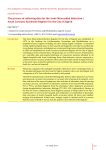Статьи журнала - Cardiometry
Все статьи: 606

The j wave: why so many contradictions and confusion in interpretation of its diagnostic value?
Ред. заметка
Бесплатно

Статья обзорная
Design of an effective succinate-based agent for the use in sports has required a profound analysis of the main action mechanisms of the agent in question. Our paper reflects basic principles, which are decisive for the design of the offered succinate-based agent to increase the organism performance and the rate of recovery after intensive physical loading. We have treated a special role of the metabolic conversions of succinate in energy exchange of mithochondria: high energy efficiency, possibility of beneficial oxidation under oxygen deprivation, anaerobic formation and possible consequences of the above phenomenon. The listed key factors have determined the applications of succinate in practice in order to maintain the energy exchange as well as design a number of anti-hypoxia means. It is assumed that the treated peculiarities of the succinate metabolism can provide the basis for formation of a signal, regulatory role of this molecule in the organism environment.
Бесплатно

The negative effects of lead paint on different physiological systems
Статья научная
Lead (Pb) in paints is a serious public health hazard that has piqued the international community’s interest. Lead concentrations in lead-based paints have been assessed in several research conducted across the world. As a result, the goal of this article was to describe the findings of these research, give some knowledge of their human health consequences for law enforcement, and promote public awareness. The most notable gaps found have been highlighted in order to open the door for additional research efforts aimed at producing thorough data on this subject. Some of the evaluated studies found considerable amounts of lead in paints that were considerably over the allowable limits, despite the many regulatory controls on lead content in paints that exist worldwide. There have been reports of children cases of lead poisoning in a number of nations, including South Africa, France, Morocco, and the US. Lead levels in South Africa (145,000 ppm), China (860,000 ppm), and the US (22,550 ppm) have all been found to be high. 4,485.11 ppm in Thailand. India (104 ppm) and Palestine (6036 ppm). As a result, tight law enforcement measures pertaining to the progressive removal of paints containing lead and the management of lead content are required throughout the globe.
Бесплатно

Статья научная
The limitations of capabilities of the existing mathematical weather prediction (including forecasting for weather-sensitive individuals) cannot be duly realized nowadays due to the fact that till now there is no proof of the existence and uniqueness of smooth solutions of the three-dimensional (3D) Navier-Stokes equation (in any finite period of time). We have obtained a new analytical solution of the Cauchy problem of this equation in an unbounded space, which has finite energy for any values of time.
Бесплатно

Статья
All human health, from the cellular level to overall well-being, is inextricably linked to the health of our mitochondria. This article delves into the concept of mitochondrial training, focusing on Hypoxic Intermittent Training (HIT) as a central method for improving mitochondrial function. It is becoming increasingly clear that various diseases, stress, shock, inflammation, aging, and organ failure are primarily the result of respiratory problems that directly affect mitochondrial health. The regulation of metabolism is closely related to gas exchange, and the composition of the gases we breathe regulates our metabolism. Our main goal is to promote efficient mitochondrial function, a key biological imperative
Бесплатно

Статья научная
The mechanisms of anti-tumor action of low intensity factors of activation therapy remain little investigated. The aim of the present paper is to study the changes in the immune system organs, the state of blood leukocytes and tumor area under effective activation therapy in tumor-bearing animals using EMR microwave range. The research is relevant due to the immune processes influence on cardiovascular system performance. Materials and methods In experiments on 77 albino outbred male rats with inoculated sarcoma-45 and Pliss lymphosarcoma tumors low intensity EMR of microwave and EHF ranges with bioeffective frequencies has been used as an activation therapy factor. The structural-functional changes in the immune system organs, some indices of blood leukocyte activity, composition of immune cells infiltrating tumors when inhibiting their growth and regression have been studied. Besides, the signs of intercellular interactions with participation of leukocytes in the tumor area have been considered...
Бесплатно

Статья научная
Considering a life cycle, we can find an interesting feature: it is linked to the performance of the cardiovascular system and it is determined by two factors as follows.
Бесплатно

Статья научная
During the pandemic of coronavirus infection, medical staff around the world has faced the problem of a significant deterioration in the health conditions of patients, who have a history of type 2 diabetes mellitus and who have infected with COVID-19.The problem of the combination of the coronavirus infection and diabetes mellitus is urgent and requires an indepth study in this context. This article presents and reviews some results of an experiment during which the clinical indicators of 15 patients with type 2 diabetes mellitus, with elevated glycated hemoglobin, infected with coronavirus infection, aged 45 to 65, were taken on the 14th day of observation.
Бесплатно

The phonocardiographic data recording & processing system: an effective approach
Отчет
Some results obtained in recording and processing of phonocardiograms are presented herein. To process phonocardiographic signals, a cascade filtration method has been used that allows detecting tones of the cardiovascular system in the background noise. The effectiveness of the proposed processing method is demonstrated by the results of visualization.
Бесплатно
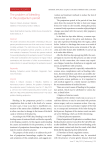
The problem of bleeding in the postpartum period
Статья научная
The article is devoted to the problem of bleeding in the postpartum period that remains one of the main causes of maternal mortality worldwide. The article discusses the main causes of bleeding in the postpartum period, symptoms, as well as the main methods of treatment. The article also presents methods for preventing bleeding in the postpartum period. The final part of the article is dedicated to the importance of regular medical examinations and observation of all the recommendations of medical doctors to prevent bleeding in the postpartum period.
Бесплатно

The problem of organizing medical care for surgical patients in rural areas
Статья научная
Topicality. Changes in medicine are one of the indispens able components of the development and progress in this industry. For many years, healthcare has been actively evolv ing based on new scientific discoveries, technological ad vances and clinical research evidence. Continuous improve ment of medical equipment has a huge impact on the health and well-being of people around the world. Along with the above, when it refers to medicine, rural areas often face problems with public access to medical care services, includ ing high-quality health care.
Бесплатно
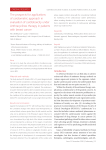
Статья научная
Aims The aim is to study the action and effects of antitumor polychemotherapy (PCT) with Anthracyclines on the cardiovascular system performance in primary oncological patients with breast cancer (BC). Materials and methods The study involved 21 females (49.8 ± 0.5 years) diagnosed with BC. PCT has been conducted in a neoadjuvant regimen in 18 patients and in an adjuvant one with Doxorubicin (60 mg/m2) and Cyclophosphamide (600 mg/m2) in 3 patients. The cardiovascular system functional state has been evaluated during six courses of PCT with the use of the Cardiocode device. At the same time, the conditions of the cardiovascular system have been assessed before PCT and during the fourth course using EchoCG and ECG. Results and conclusions Against the background of PCT with Anthracyclines noted are the cumulative changes in the blood vessel hemodynamics as reduced blood volumes ejected from the left ventricle and the atria and as alterations in the Rheogram signal. Observed is predominance of exchange of anaerobic energy over the aerobic one, characterized by a high level of the lactate concentration and accompanied by a decrease in the oxygen concentration on course 3, an increase in the phosphocreatine level on course 4 and its decrease during courses 5 and 6 of PCT...
Бесплатно
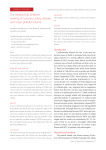
The relationship between severity of coronary artery disease and mean platelet volume
Статья научная
Aims Increased MPV is a risk factor for cardiovascular diseases and can be associated with coronary artery involvement. In this study, we aimed to investigate the relationship between the severity of coronary artery disease and MPV. Materials and methods In this study, a total of 200 patients with coronary artery disease were enrolled. All patients initially underwent coronary angiography. Plasma TG, LDL, and HDL, was measured using commercial kits Integra 800TM. MPV and platelet count was determined by the Sysmex XT-2000iTM. Population were divided into three groups based on the SYNTAX score: low, moderate and high. All angiographic grading of SYNTAX was carried out by two cardiologists with blinded clinical data. After Data collection, these data were entered to SPSS22 software and were analyzed using correlation coefficient regression analysis. Results A total of 200 patients entered to the study that 43% and 57 % of patients were female and male, respectively. eighty-seven patients were diabetic and other 113 patients were not diabetic...
Бесплатно
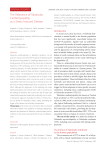
The relevance of Takotsubo cardiomyopathy as a stress-induced disease
Статья научная
Takotsubo cardiomyopathy, or Takotsubo syndrome, can be quite rare found, but however the frequency of diagnosing with this disease among patients of cardiology departments is constantly growing. On the one hand, this may be due to improved diagnostics of this pathology, and on the other hand, to an increasing frequency of mental disorders in the human population and the spread of other risk factors, including drug-induced variants. The pathogenesis of the development of Takotsubo cardiomyopathy is associated with an increase in the level of catecholamines, which may be the result of a reactive sympathetic enhancement in response to external factors or be the result of taking antidepressants that can produce a similar effect. Although the diagnostics of this pathology has made significant progress, but however there is still no consensus on the strategy of treatment. This is due to the lack of large-scale randomized prospective studies that could justify one or another therapeutic approach. Basically, the efforts of medical doctors are aimed at maintaining cardiac activity, eliminating the trigger of the disease and at treating complications.
Бесплатно
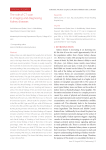
The role of CT scan in imaging and diagnosing kidney diseases
Статья научная
Kidney stones are solid deposits that usually form in the kidneys. These deposits can be very small, the size of a grain of sand, or be larger than that. They may take different shapes and cause several symptoms. The pain is usually caused by the movement of stones into the urinary tract, causing irritation and swelling of the surrounding tissue. The research was conducted in At Al-Sadr Teaching hospital The number of patients was 150 samples, 100 of which were males and 50 of which were females. The age of the patients was 40.141±1.77 for males and 2.7±44.234 for females. The clinical results for symptoms of fever were 38.% yes, while 62% there was no fever and The clinical findings. of Vomiting and Nausea 49% were yes, while 51% there was no Vomiting and Nausea as well as The clinical findings of Pain and Severe back spasms 13% were yes, while 87% there was no Pain and Severe back spasms and also The clinical findings of Severe pain in the Right flank.12% were yes, while 88% there was no Pain and 87 Severe back spasms. Clinical results for symptoms of Pain in the Ribs and Rib Cage were 38% yes, while 62% there was no Pain in the Ribs and Rib Cage while The clinical findings of Burning During Urination 12% were yes, while 88% there was no Burning During Urination, the clinical findings of Frequent Urination a Number of Times 50% were yes, while 50% there was no Frequent Urination a Number of Times symptoms and clinical findings of Urinating a Small Amount of Urine and The clinical findings of Dark or Red Urine in the same percentage, while The clinical findings of Does Urination Smell bad 12.5% were yes, while 87.5% there was no Does Urination Smell bad and The clinical findings of Feeling pain when Urinating 14% were yes, while 86% there was no feeling pain when urinating. This shows that kidney stones have a clear clinical effect.
Бесплатно
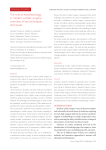
The role of anesthesiology in modern cardiac surgery: overview of key techniques and issues
Статья научная
Anesthesiology plays a key role in modern cardiac surgery, ensuring the safe conduct of surgical interventions on the heart and blood vessels. The paper provides an overview of the main techniques and problems in the field of anesthesiology in cardiac surgery. The first section is devoted to the basic methods of anesthesiological provision of cardiac surgery. He describes the various types of anesthesia used in cardiac surgery, including general anesthesia, epidural and spinal anesthesia, as well as combined methods. The advantages and disadvantages of each of them are considered, as well as the specifics of their application, depending on the type of operation and the patient’s condition. The second section examines the key problems faced by anesthesiologists in cardiac surgery. This includes managing hemodynamic parameters during surgery, monitoring heart and respiratory function, ensuring adequate analgesia, and preventing possible complications such as myocardial ischemia, arrhythmias, hypothermia, and thromboembolic events. Special attention is paid to solving problems related to patients with concomitant diseases such as hypertension, diabetes mellitus, chronic obstructive pulmonary disease, etc. The article discusses the features of the use of cardiothoracic anesthesia in cardiac surgery, as well as emerging problems and prospects in this area. An overview of the use of anesthesia in the field of cardiac surgery is presented, both current challenges and problems in this area are highlighted. The current state of anesthesia in cardiac surgery is analyzed and a number of problems faced by anesthesiologists during cardiac surgery, including problems of cardiothoracic anesthesia, are highlighted. This includes difficulties with controlling the depth of anesthesia, ensuring safety while maintaining artificial circulation, managing fluid balance, and monitoring cardiac function during surgery. The article reveals the relevance and importance of the work of anesthesiologists in cardiac surgery and the problems they face, as well as reveals the prospects for the development of anesthesia in cardiac surgery. This work will help anesthesiologists and cardiac surgeons better understand the specifics of anesthesiological care in cardiac surgery and effectively solve emerging problems, ensuring maximum safety and comfort for patients.
Бесплатно
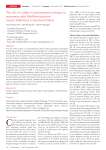
Статья обзорная
The aim of this article is a comprehensive review of the publications during the last decade in order to evaluate current indications for cardiac resynchronization therapy (CRT) in patients with heart failure (HF) and atrial fibrillation (AF). Clinical studies show that CRT not only improves HF symptoms and quality of life but also reduces morbidity in New York Heart Association (NYHA) class III or IV patients with reduced left ventricular ejection fraction (LVEF) and wide QRS. The loss of atrioventricular synchrony and difficulty to ensure an adequate biventricular pacing worsens these patients response to CRT. According to the latest guidelines CRT should be considered for patients to reduce all-cause mortality in patients with chronic HF, QRS ≥ 120 ms and LVEF ≤ 35% who remain in NYHA functional class III/ambualtory class IV despite at least 3 months of optimal pharmacological theraphy who are expected to survive at least 1 year with good functional status, provided that biventricular pacing as close as possible to 100% can be achieved (class IIa, level B). Despite the fact that there is a general agreement on the indication for CRT in AF patients, their optimal management strategy still remains a matter of discussion.
Бесплатно
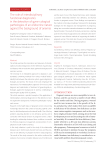
Статья научная
The article examines the importance and relevance of interdis-ciplinary functional diagnostics for the detection of gynecolog-ical diseases with an endocrine basis against the background of anemia in women. The necessity of an integrated approach to diagnosis is sub-stantiated, combining methods from various medical fields to identify links between the endocrine system, gynecological pa-thologies and anemia. The results of the work emphasize the importance of an interdisciplinary approach for more accurate diagnosis and optimization of treatment of gynecological pa-thologies against the background of anemia, contributing to improving the quality of life of patients. This article examines a practical example of the application of interdisciplinary functional diagnostics for the detection of ane-mia against the background of endocrine pathologies in preg-nant women. Research on the health status of pregnant women is becoming increasingly relevant in the context of ensuring optimal condi-tions for fetal development and maternal health. One of the key problems requiring attention is iron deficiency anemia and its connection with thyroid function in pregnant women. Under-standing the relationship between these conditions is essential for effective pregnancy management and prevention of com-plications in both mother and fetus. In this study, attention is paid to the study of the relationship between serum ferritin levels, thyroid hormones and the pres-ence of iron deficiency in pregnant women in early pregnancy. The results of the study reviewed in this article confirmed the existence of an inverse correlation between serum ferritin levels and the level of one of the thyroid hormones, which indicates a possible relationship between iron deficiency and thyroid function in pregnant women. These findings are important to the medical community, providing a framework for developing strategies for the diagnosis and management of pregnancy, taking into account the interaction between iron deficiency and thyroid function. The results of the study can become a starting point for new research approaches and contribute to the devel-opment of more effective methods of supporting the health of pregnant women. This article also focuses on the development of anemia in women in the menopausal period.
Бесплатно
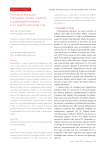
Статья научная
Pyelonephritis is a serious disease that is widespread in Iraq and is mostly caused by Gram-negative bacteria, which are highly contagious and can spread from an infected person to others. The aim of this article was to evaluate the immunomodulatory role of Monocyte chemotactic protein-3 (MCP3) in the blood serum of patients with acute pyelonephritis and chronic pyelonephritis. A group of patients suspected of having nephritis were sampled in Najaf city, Iraq. Clinical and biochemical tests were performed to confirm their infection. Where 30 patients had acute pyelonephritis and 30 patients had chronic pyelonephritis, in addition to 29 healthy people who were considered control. MPC-3 was measured in the serum of the affected person using ELISA technology. MPC3 levels were significantly elevated (P
Бесплатно

